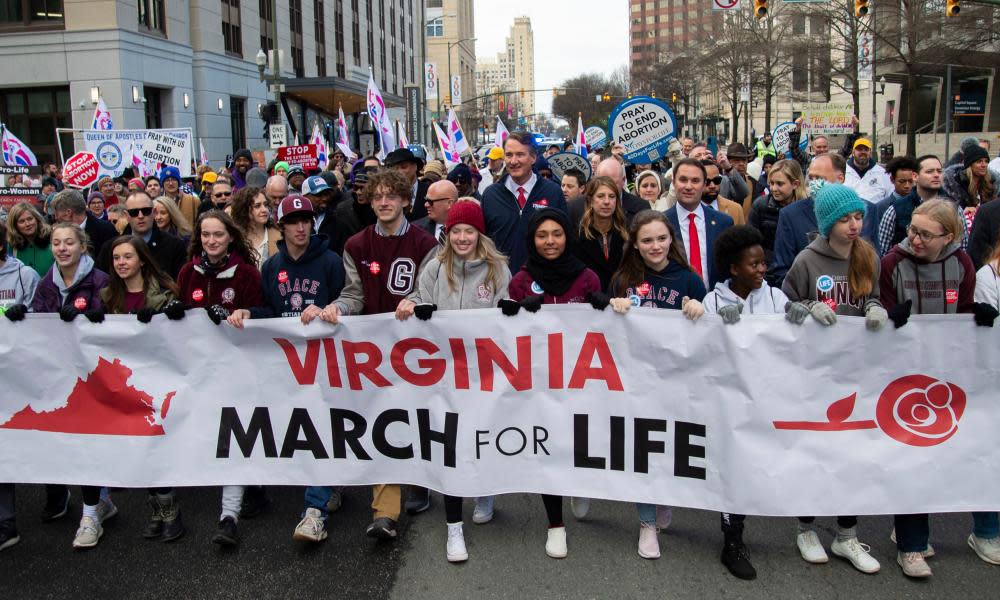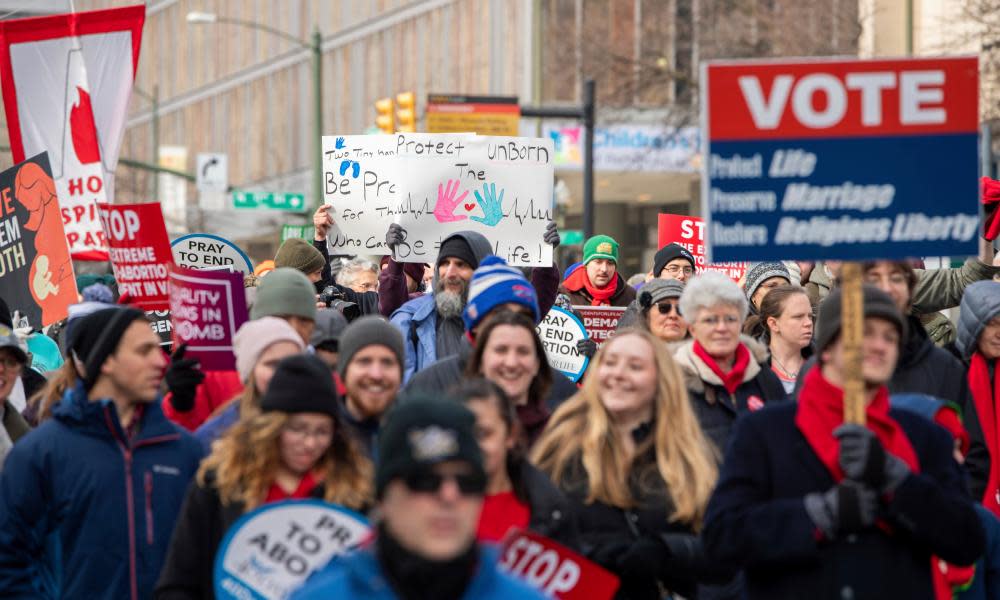‘There is no ban’: Republicans test-drive new abortion messaging
The ad opens with the sound of a fetal heartbeat.
“Most people believe that abortion at the moment of birth is wrong, far beyond any reasonable limit. Not Virginia Democrats,” a female narrator says, just before the sound of a baby cooing and crying. “They fought to make late-term abortions the rule, not the exception.”
Related: ‘It’s cruel’: the last southern refuge for abortion rights might soon fall
At the end of the ad, the heartbeat flatlines.
The digital ad, released in the last few weeks by the Virginia Republican party, is part of a six-figure effort to win over voters ahead of Virginia’s state legislative elections on 7 November. It aims to portray Democrats as abortion extremists and Republicans as champions of a reasonable compromise on a notoriously controversial issue. And it’s a new, risky Republican strategy – led by Virginia’s Republican governor, Glenn Youngkin – to recast abortion as a winning issue, after the supreme court’s overturning of Roe v Wade last year led the GOP to underperform in the 2022 midterms.
If this strategy works in Virginia, it won’t stay there. The Virginia Republican party is hoping to retake control of the state senate after winning both the house of delegates and the governor’s mansion in 2021. If they succeed, Republicans across the country will likely push the 15-week ban in their own 2024 races.
“Both parties will claim, if they win, that, as goes Virginia, so goes the rest of the country. But what you really get, I think, is the testing of the messaging in Virginia,” said Stephen Farnsworth, director of the Center for Leadership and Media Studies at University of Mary Washington in Virginia. “It’s clear that Republicans have struggled to talk about abortion since the supreme court decision, and this will be the latest test of Republican anti-abortion messaging.”
Before Roe fell, abortion usually motivated Republicans, not Democrats, to head to the ballot box; while only a minority of Americans totally oppose abortion, those voters are some of Republicans’ most committed constituents. For decades, Republicans were able to appease them by passing abortion restrictions – but were also largely able to evade any political fallout from those restrictions, because Roe stopped them from taking effect.

Those guardrails are now gone, and Virginia is the only southern state that hasn’t significantly restricted abortion since Roe’s demise. More than 70% of Democrats and half of Republicans in the state say abortion is an important issue to them in this election, according to an October poll from the Washington Post and the Schar School of Policy and Government at George Mason University.
“It’s a winning issue for the Democrats, if they know how to message it properly,” said Mark Rozell, founding dean of the Schar School. “So I think Youngkin’s strategy, and that of the Republicans in Virginia, is to frame the issue in a way that will not seem threatening to swing voters.”
Republicans are trying to reframe the issue by digging into the faultlines within Americans’ support for abortion. Although most Americans have long supported access to abortion – and even more support it in the wake of Roe’s downfall – most people say they don’t think the procedure should be legal past the first trimester of pregnancy. (While the majority of US abortions do take place in that first trimester, abortion providers and their supporters say that, post-Roe, more people are getting abortions later on in pregnancy, as stringent restrictions have slowed down their access to the procedure.)
Related: ‘He’s pretty smooth’: Glenn Youngkin of Virginia may be a challenger for Trump
At the same time, abortion is a notoriously difficult subject to poll people about. Depending on how pollsters ask a question, respondents can give wildly different, even contradictory, answers.
Right now, Virginia law allows abortion through the second trimester of pregnancy, or up until about 27 weeks. In the October poll from the Schar School and the Washington Post, 49% of voters said they would like Virginia’s abortion laws to stay the same, while 24% said that they would like those laws to loosen. But in that same poll, support for a 15-week ban was evenly split – contradicting the widespread support for keeping or broadening Virginia’s laws.
“The idea that advocating for commonsense protections for the unborn will doom Republicans is a narrative concocted by liberals, and I don’t put much stock in it,” Ken Nunnenkamp, executive director of the Virginia Republican party, said in an email. It’s Democrats, he said, who are refusing to be straightforward about their views on abortion. “Republicans have a responsibility to call out Democrat abortion extremism.”

The Virginia house Republican caucus and Virginia senate Republican caucus have bought a website, nolimitsvirginia.com, to target Democrats on abortion. The website recycles common myths about abortion, such as the use of the medically inaccurate term “late-term abortion” and suggesting that Democrats support allowing abortions to take place “until the moment of birth”.
The website also quotes the Democratic state delegate Kathy Tran, who is now running for re-election and said in 2019 that a proposed bill would permit abortion “all the way up to 40 weeks”. (Tran later told the Washington Post that she “misspoke”.)
Morgan Hopkins, the communications director for the Virginia house Democratic caucus, said that Democrats do not support any further restrictions on abortion.
“Democrats have always been clear that this decision should be between a woman and her doctor,” Hopkins said. “There’s no compromising on that.”
In another rhetorical tactic, Virginia Republicans are also striking the word “ban” from their vocabulary and replacing it with “limit”. In October, Youngkin’s political action committee, Spirit of Virginia, dropped $1.4m into an ad buy that included a spot focused on abortion. “It’s just not true. Their lies about abortion,” a female voice says at the beginning of the ad. “It’s disinformation. Politics at its worst.
“Here’s the truth. There is no ban,” the ad’s narrator continues, as a baby begins to gurgle in the background. “Virginia Republicans support a reasonable 15-week limit with exceptions for rape, incest and life of the mother.”
In a sign of just how central this message is to the Republican state senator Siobhan Dunnavant’s re-election campaign, visitors to her website are greeted with a pop-up ad titled “Not a Ban … ”
In the ad, Dunnavant tells the camera: “I don’t support an abortion ban. Period.” The ad goes on to explain that Dunnavant, who is running for re-election in a district that includes part of the city of Richmond, Virginia, supports banning abortion after 15 weeks, with some exceptions. (Dunnavant’s team did not reply to multiple interview requests.)
Youngkin did not dream up the idea of a 15-week “limit” on his own. Instead, it is rapidly becoming a flagship Republican policy. The case that overturned Roe v Wade, Dobbs v Jackson Women’s Health Organization, hinged on a 15-week abortion ban from Mississippi. Susan B Anthony Pro-Life America, a powerful anti-abortion group that operates nationwide, has also been pushing Republicans to support a 15-week federal ban.
Kaitlin Makuski, political director for Susan B Anthony Pro-Life America, applauded Virginia Republicans’ support for what she called a “commonsense and compassionate 15-week limit”.
“Candidates across this country should take note of how Republicans in Virginia are leading on the issue of life by going on offense and exposing the left’s radical abortion agenda,” she said in a statement.
Virginia Democrats, meanwhile, are trying to bring up the word “ban” whenever they can.
“A ban is a ban is a ban,” Hopkins said. “What they’re talking about is a ban on a right that so many women had access to for years. I’m 24 in Virginia, and now I might have less rights than my mom did, who was born in 1968. To me, that is something that is absolutely insane.”
